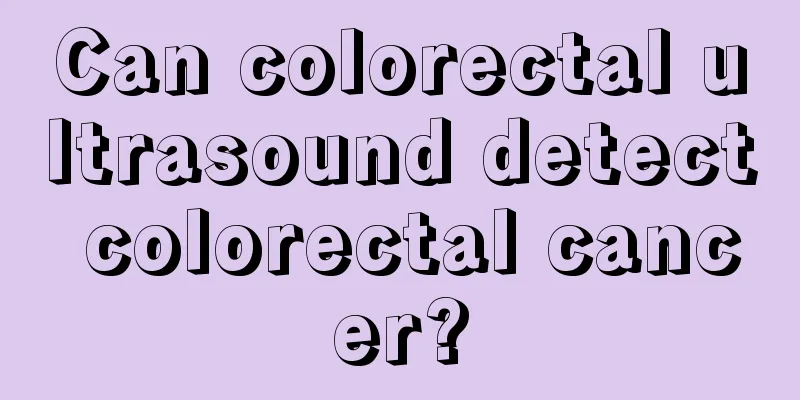Can colorectal ultrasound detect colorectal cancer?

|
With the improvement of living standards, the quality of life has also greatly improved. Many people choose high-calorie, high-fat foods. For young people, crude fiber and coarse grains seem to have withdrawn from people's lives. This has led to the occurrence of various diseases. Colorectal cancer is one of them. How to check for colorectal cancer, which has a very high incidence rate! Let us introduce it to you in detail below. 1. Laboratory examination Blood routine, complete biochemistry (liver and kidney function + serum iron), stool routine + fecal occult blood and other laboratory tests can help understand whether the patient has iron deficiency anemia, liver and kidney function and other basic conditions. Testing for blood tumor marker carcinoembryonic antigen (CEA) can help diagnose tumors. In patients with colorectal cancer, high CEA levels do not mean that there is distant metastasis; in a few patients with metastatic tumors, CEA levels are not elevated. 2. Endoscopic examination Colonoscopy is to insert a fiber colonoscope into the ileocecal region at the beginning of the colon to examine the colon and rectal cavities, and perform biopsies and treatments during the examination. Colonoscopy is more accurate than barium enema X-rays, especially for small colon polyps, which can be removed by colonoscopy and confirmed by pathology. Removal of benign polyps can prevent them from turning into colorectal cancer, and cancerous polyps can help clarify the diagnosis and treatment. 3. Biopsy and exfoliative cytology Biopsy is of decisive significance for the diagnosis of colorectal cancer, especially early cancer and polyp cancer, as well as for differential diagnosis of lesions. It can clarify the nature, histological type and malignancy of the tumor, judge the prognosis and guide clinical treatment. Exfoliative cytology has high accuracy, but the sampling is cumbersome, and it is not easy to obtain satisfactory specimens, so it is rarely used in clinical practice. Colorectal cancer must be differentiated from other intestinal lesions with symptoms such as abdominal mass, abdominal cramps, rectal bleeding or changes in bowel habits, including benign tumors or polyps of the colon such as adenoma, inflammatory polyps, juvenile polyps, intestinal wall lipoma, hemangioma, leiomyoma, etc.; various inflammatory diseases of the colon such as ulcerative colitis, Crohn's disease, amoebic enteritis, Japanese schistosomiasis, intestinal tuberculosis, colon diverticulitis, inflammatory masses around appendicitis, radiation enteritis, venereal lymphogranuloma, etc., benign rectal and anal canal diseases such as hemorrhoids, anal fissures, anal fistulas, etc. Others such as intussusception, sigmoid colon fecal mass storage and rare intestinal endometriosis are also included in the differentiation. Since the symptoms of colorectal cancer are not specific and overlap with the clinical manifestations of various intestinal diseases, active diagnosis is often used in clinical diagnosis, and exclusion diagnosis is rarely used. For suspected patients, detailed medical history is inquired and careful examination is performed, and a clear diagnosis can often be made with fiber colonoscopy or X-ray barium meal enema and pathological biopsy. Colon cancer should be mainly differentiated from colon inflammatory diseases, including intestinal tuberculosis, Crohn's disease, ulcerative colitis, schistosomiasis granuloma, amebiasis granuloma, etc. In addition, it should be differentiated from primary liver cancer, biliary tract disease, and appendix abscess. Rectal cancer should be differentiated from bacillary dysentery, amoebic dysentery, hemorrhoids, schistosomiasis, chronic colitis, etc. Through the above introduction, we have learned about the examination of colorectal cancer and how to make a differential diagnosis. I hope that friends can understand their own physical changes through learning, and choose the appropriate examination method according to the severity of their condition. Colorectal cancer is one of the malignant tumors, which brings great physical harm to patients. Therefore, friends in life must develop good eating habits, which can also effectively reduce the occurrence of colorectal cancer. |
<<: What are the methods for colorectal cancer examination
>>: What are the methods for colorectal cancer examination
Recommend
Symptoms of a sore nose_What are the symptoms of a sore nose
There are reasons for a sore nose, but many peopl...
What eyebrow shape is suitable for a round face?
Each of us is different because we have different...
Analysis of high-risk factors for postoperative recurrence of sacrococcygeal teratoma
Analysis of high-risk factors for postoperative r...
The best exercise for teratoma patients is walking
Teratoma, also known as ovarian dermoid cyst in m...
How to remove pubic hair? 10 steps to teach you how to remove pubic hair correctly
The arrival of summer means that we can soon wear...
What are the symptoms of prostate cancer
The number of elderly people suffering from prost...
Benefits of drinking milk before drinking
Nowadays, people are working hard in their career...
What does a neck lump caused by nasopharyngeal carcinoma look like?
Neck lumps caused by nasopharyngeal carcinoma usu...
Sunbathing can effectively help you prevent ovarian cancer
Ovarian cancer is a disease that can seriously th...
How many stages are there for prostate cancer? Is there any hope for advanced prostate cancer?
Medical research has shown that the occurrence of...
Traditional Chinese Medicine Meridian Health Knowledge
From the perspective of traditional Chinese medic...
Only by combining the diagnosis of liver cancer can patients receive treatment as early as possible
Liver cancer is a common tumor disease in my coun...
Is bladder cancer related to race? What is the best way to prevent bladder cancer?
In the United States, the incidence of bladder ca...
Diet after cervical cancer surgery
The incidence of cervical cancer has been increas...
Can I eat yogurt when I'm hungry
Most pregnant women will experience morning sickn...









